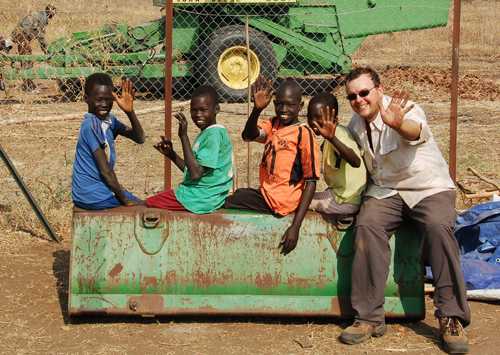Story by Declan Kelly

As co-founder of ON Communication Inc., based in London, Ont., Robert Boyer, MBA ’00, uses a simple tag line to describe his role in the company: “I connect the dots.” With a background in farming, a math degree and his current work with international clients in a variety of industries, Boyer has learned to link dots many people wouldn’t think to connect.
Still, nothing could quite prepare him for the many connections he has had to make to help some of the world’s poorest people break free of a seemingly endless cycle of poverty, war and strife. In 2007, Boyer was working on a number of projects for London developer David Tennant Sr. when Tennant asked him to help with a humanitarian initiative in southern Sudan. Boyer’s involvement with Canadian Economic Development Assistance for Southern Sudan (CEDASS) quickly grew from volunteer adviser to hands-on project leader for the organization’s Jebel Lado farm operation.
“I said, ‘There are a lot of areas in Africa where they can grow their own food,’” Boyer recalls of an early conversation with Tennant. “But visually, when I said that, I had no idea where it was located. Three weeks after that, we were on an airplane and he said, ‘Let’s go look at the logistics.’”
Their research showed the soil in the Jebel Lado region was among the most fertile in Africa, being located in a flood basin of the Nile River. Boyer then set about organizing a call for donations from both the farm community in London and a number of his corporate clients. He soon collected tractors, combines and other supplies.
By fall 2008, the farm had harvested a 50-acre plot of sorghum, a native crop resembling a mix of wheat and corn. Boyer and his team have since expanded to a 120-acre plot, which led to a five-tonne surplus that villagers were able to sell through the United Nations World Food Program. The Sudanese government was so impressed with the Jebel Lado results that Boyer and his team were asked to work out the logistics of expanding to a 20,000-acre operation.
“It’s the old saying of teach a person to fish and they’ll eat forever, and that was the whole premise here,” Boyer says. “We want to teach people and we want to build a business, but at the end of the day, it’s theirs and not ours. If they can run that and build their own farms someday, then we’re successful.”